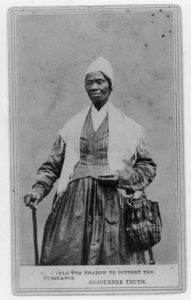By Rick Geffken
“Ain’t I a Woman?” asked Sojourner Truth in 1851 in her legendary speech at the Women’s Rights Convention in Akron, Ohio.
One hundred and seventy-five years later, people are still interested to hear the words of the once enslaved activist and her brave personal story.
Earlier this month, the Eatontown Historical Society and the local chapter of the American Association of University Women gathered to hear Eatontown resident Lorraine Stone perform her interpretation of Sojourner Truth in period costume at two Black History Month events at the Eatontown Community Center.
It’s a historical interpretation that remains meaningful, even though she’s performed it hundreds of times.
“When I dug into her life, I found what no one had ever taught me about her. She had a very hard life from the beginning, before she liberated herself. Sojourner became my ‘she-ro,’ my woman hero.”
Sojourner Truth was born Isabella Baumfree in 1797, enslaved to a Dutch-American family in upstate New York. During her remarkable 86-year life, she “walked away” to freedom and later won several court cases in a time when few African-Americans dared to seek legal remedies to their problems.
In 1843 she changed her name and began to travel around the country preaching her abolitionist message.
During post-performance comments to her audiences, Stone shares insights into Sojourner Truth’s advocacy for human rights in mid-19th century America, which seems especially relevant to the current Black Lives Matter and #MeToo movements. Stone believes everyone can find inspiration in the life of Sojourner Truth.
Lorraine Stone makes no claim that her own life is as dramatic as Sojourner Truth’s, but her journey toward portraying this remarkable African-American woman relates to her own social justice experiences. Raised in Asbury Park, Stone’s early acting career began at the Bethel African Methodist Episcopal Church (AME).
“Back when I was growing up in the ’50s and ’60s, in the black churches they would have a ‘tea’ on Sunday afternoons, usually a fundraiser for the Missionary Society or the Pastor’s Aide Society. I was asked to recite poetry in the afternoons after Sunday services when I was around 6,” she said.
Her mother Drusilla Stone encouraged her education and acting. “I remember one book she found me, I still have it, called ‘Alabaster Boxes,’ a collection of poems, many of them with a spiritual bent, but not religious.” One of the poems Stone memorized that was a particular favorite of the AME members was called “The Devil Went to Church.”
Stone graduated with a degree in communication arts and sciences from Hampton Institute in Virginia, now known as Hampton University, where she was part of the college’s dramatic ensemble. She did graduate studies at the New School for Social Research in New York.

Stone has spent years researching Sojourner Truth’s life and speeches, particularly at the Schomburg Center for Research in Black Culture in New York City. “That’s where I first came across ‘Ain’t I a Woman,’ ” she said. “I did my first Sojourner Truth around 1974.”
Marriage, children and a job with IBM requiring cross-country moves filled Stone’s life until she finally returned to Asbury Park in the late 1990s. She worked in journalism and mentored young people in an after-school program, the Girl Scouts and the summer recreation program. These experiences led her toward activist roles on church and social committees all around Monmouth County.
One of her most important volunteer positions was developing community outreach strategies for the Black Infant Mortality Reduction Program. Stone is now a community outreach worker and a board member of the T. Thomas Fortune Foundation in Red Bank. She’s part of the planning committee for a preview opening of its cultural center Feb. 24 and a formal public opening in May.
One of Stone’s favorite venues is the Quaker Meeting House at Route 35 and Sycamore Avenue in Shrewsbury. “That building must be very like places where she spoke,” Stone said. “It’s transporting. Sometimes I say to my audiences, ‘I want to take you where you haven’t been. Close your eyes and imagine everything you know in your life is gone, no cars, no home, no electricity.’ I take myself back to that time when I do this portrayal.”
Stone said she often hears how much people admire Sojourner Truth’s work on the Underground Railroad. She gently corrects these folks, saying, “That’s the other one, Harriet Tubman.” Through her performance company, The Wisdomkeeper, Stone also offers portrayals of heroic African-American women like Tubman, as well as well as the reporter who began her career working for T. Thomas Fortune in Red Bank, Ida B. Wells.














